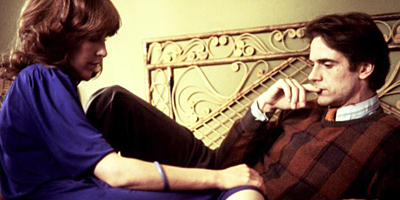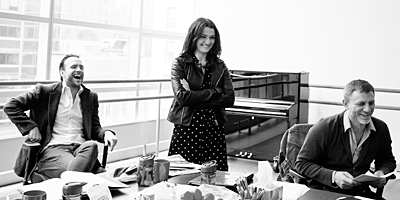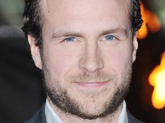Betrayal Exposed: How Harold Pinter’s Real-Life Affair Inspired an Illicit Love Triangle on Stage & Screen
Daniel Craig, Rachel Weisz and Rafe Spall are embroiled in a secret love triangle in the new Broadway revival of Betrayal, opening October 27 at the Ethel Barrymore Theatre. Read below to find out how Harold Pinter’s real tryst inspired a play about infidelity and deception that great actors can't resist.

AN AFFAIR TO REMEMBER
At a London party in 1960, playwright Harold Pinter fell head over heels for a young BBC reporter named Joan Bakewell. There was only one problem—they were both married to other people. As Bakewell and Pinter carried on a secret affair, the playwright became fast friends with his lover’s husband, BBC radio producer Michael Bakewell. The secret relationship lasted for seven years, until Michael Bakewell revealed that he knew about his friend and his wife. In fact, he’d known for two years. “I remember vividly Harold's indignation at the fact that I had known for a long time about the affair without saying anything,” Michael Bakewell said in Michael Billington’s 2007 biography Harold Pinter. “I think he personally felt betrayed."
Inspired by his real-life love triangle, Pinter began to work on Betrayal, a drama detailing the secret affair of two already-married lovers, told in reverse chronological order. The playwright sent the completed script to Joan Bakewell, but her response was less than positive.
“The play portrayed many of the events of the affair between us, with an accuracy verging on the literal,” Bakewell told The Telegraph. “At the time when he first sent me the script, I was deeply distressed to have our private affair so glaringly presented on stage.” But Pinter continued to work on the script, without the approval of his ex-lover—it is called Betrayal, after all.

ART IMITATES LIFE
Helmed by Royal Shakespeare Company founder Peter Hall, Betrayal premiered at London’s National Theatre in 1978, starring real-life married couple Penelope Wilton and Daniel Massey as philandering wife Emma and her husband, Robert, and Michael Gambon as Robert’s best friend (and Emma’s secret lover) Jerry. But according to Pinter’s second wife, author Antonia Fraser—who also got together with the playwright via an affair, but that's another story—the production wasn’t exactly smooth sailing.
“Rehearsals are not going well at the National,” Fraser recounted in her memoir Must You Go? My Life with Harold Pinter. “Dan [Massey] strikes his breast frequently and says he doesn’t feel it here, the humanity of the character. On the first night, no one knew for sure until the curtain went up whether the play would take place.” Despite backstage tension and lukewarm reviews (The Times called it “a blank endorsement of the obvious”), Hall’s production transferred to Broadway in 1980 with an exciting new cast.
Betrayal fared slightly better on the Great White Way in a six-month-long run at what is now the Nederlander Theatre, with New York Times critic Walter Kerr calling it “as mesmerizing as a cobra.” Blythe Danner (who gave a shout-out in her program bio to seven-year-old daughter Gwyneth Paltrow) was cast as Emma, with a pre-Nine Raul Julia as Jerry and Jaws favorite Roy Scheider as Robert. The production garnered Tony nominations for Danner and Hall—it also sparked the interest of producer Sam Spiegel, who thought Pinter’s scandalous story had big-screen potential.

HELLO, HOLLYWOOD
Spiegel, who had produced blockbusters The African Queen and Lawrence of Arabia, secured a rising star for the Betrayal film: Meryl Streep, who had just won an Oscar for Kramer vs. Kramer. With Mike Nichols (The Graduate, Who’s Afraid of Virginia Woolf?) attached to direct, the film seemed poised to be a hit. But when Nichols clashed with Spiegel’s slow and methodical working style, he decided it wasn’t the project for him. “Eventually I slipped away and said I wouldn’t be able to direct it,” Nichols told radio program On Point. Streep followed suit, admitting she would prefer to stay with her husband and newborn son in America than shoot a film in England.
These setbacks didn’t deter Spiegel—Jeremy Irons, fresh from his turn in Moonlighting, took on the role of Jerry, with Ben Kingsley as cuckolded and clueless (or is he?) husband Robert. Streep was replaced with British actress Patricia Hodge, who was virtually unknown on the big screen. With director David Jones at the helm, Betrayal was a hit with critics, including Vincent Canby of the Times, who wrote, “I can’t think of another recent film that is simultaneously so funny, so moving and so rigorously sentimental. This is pure Pinter, well served by collaborators.”
Behind the scenes, tension mounted between Pinter and Spiegel. The producer claimed that Betrayal was based on events in Pinter’s life, while the playwright adamantly denied it. “That is a fantasy on Mr. Spiegel’s part,” Pinter told Roger Ebert. “I was much more interested in the friendship between the two men than in the ‘affair’ aspects of the story.” The playwright later admitted in Billington’s biography that the play was semi-autobiographical, supporting Bakewell’s claims that nearly every word of Betrayal is true.

BROADWAY BOUND
In 2000, director David Leveaux set out to helm a 20th anniversary Broadway revival, and he had just the leading lady in mind: Rachel Weisz, fresh from her turn in The Mummy. “She wasn’t the star that she is now, and [the producers] were saying, ‘We don’t know if we can get it off the ground,’” Leavaux told The Independent. Instead, the director opted for the trio of Juliette Binoche as Emma, Liev Schreiber as Jerry and a pre-Mad Men John Slattery as Robert. The production earned a Tony nomination for Best Revival of a Play, as well as a Best Actress nod for Binoche.
One Oscar and dozens of films later, Weisz is finally making her Broadway debut as Emma in a revival of Betrayal helmed by Nichols, who had always wanted another chance to direct the piece. Weisz’s husband, film superstar Daniel Craig, was offered the role of Jerry, but he asked to play the less glamorous Robert, Emma’s husband, instead. Sharing the stage with his wife “feels like an obvious thing to do,” Craig told The New York Times. When British actor Rafe Spall auditioned for Jerry, Nichols knew instantly that the love triangle was complete. “[Spall] just burst into flames,” the director said. “We were all sort of shook up. Something alive happened between the three of them.”
Although Weisz and Craig are famously tight-lipped about their private lives, they’re committed to baring it all onstage at the Barrymore Theatre. “Our relationship is nobody’s business but ours,” Craig told Vulture. “We’re going on stage together, and we know we’re exposing ourselves, but we’re professionally exposing ourselves, which is what we do [as actors].”
The new production is apparently adding an extra layer to the trio's relationship that the late playwright might not have approved of. "[Pinter] said there's no homosexual overtones at all in the play," Craig told NPR. "But obviously we're throwing loads in. Just to let you know." Reflecting on his stage return four years after a sold-out run with Hugh Jackman in A Steady Rain, Craig called acting on Broadway “on one hand incredibly scary, and on another just an exhilarating thing to do. Broadway audiences are just like nowhere else on earth.”
See the lies and deceit exposed in Betrayal, opening October 27 at the Barrymore Theatre.


